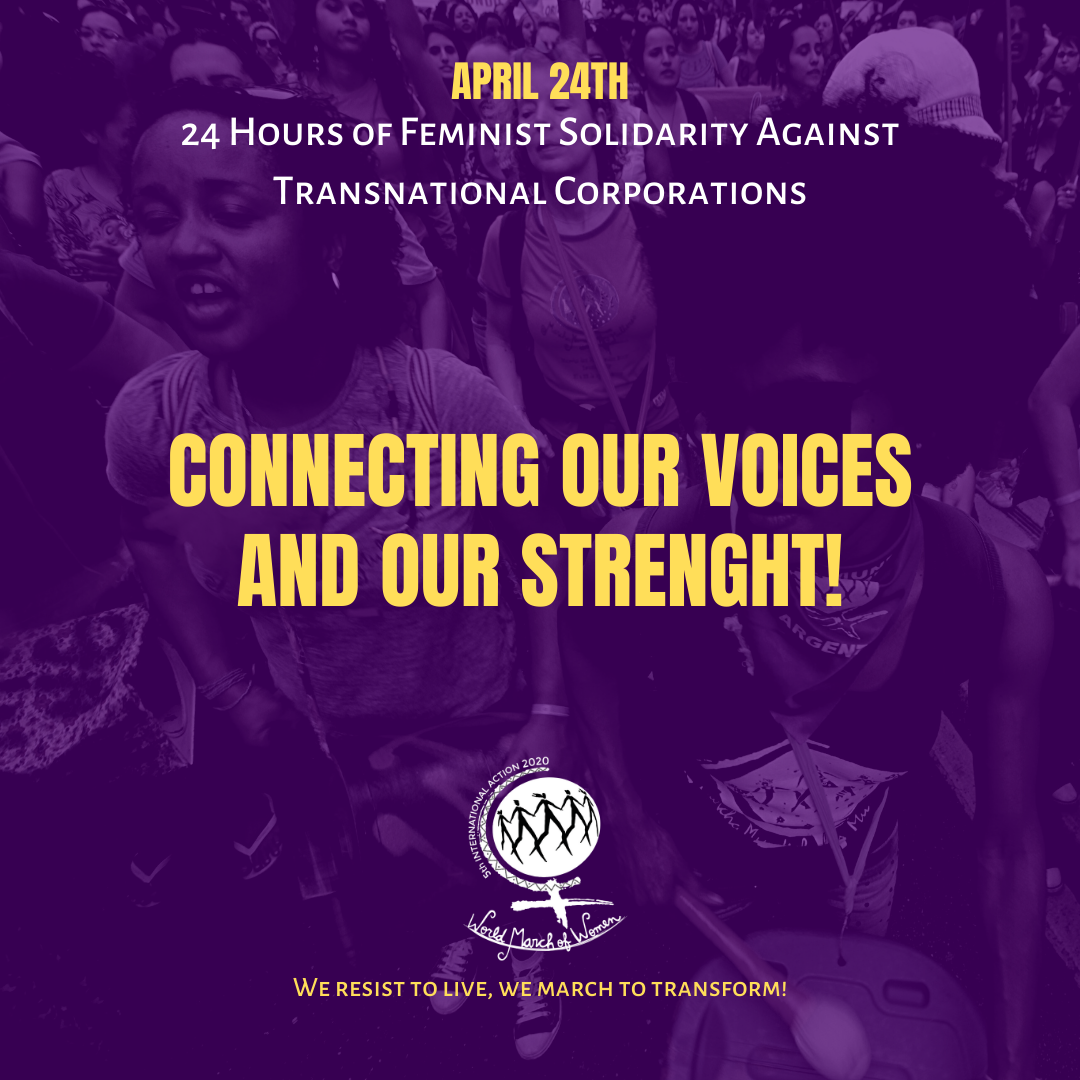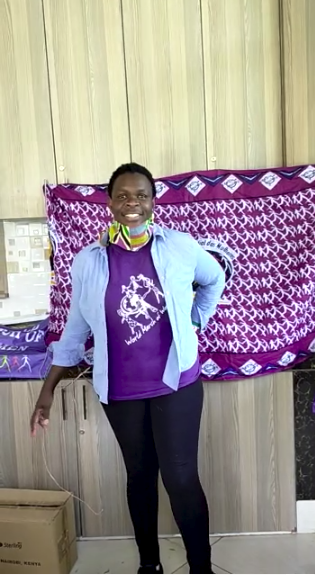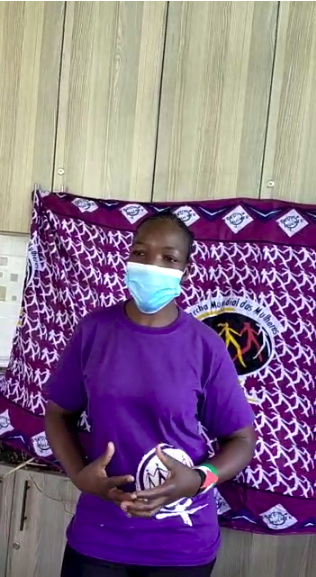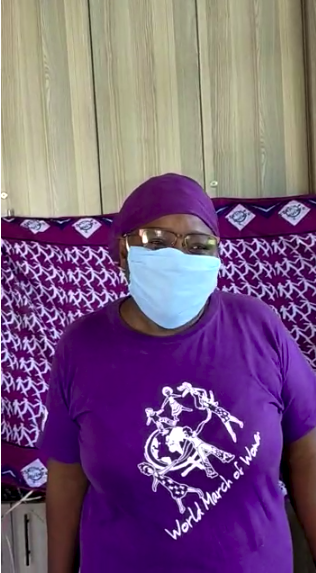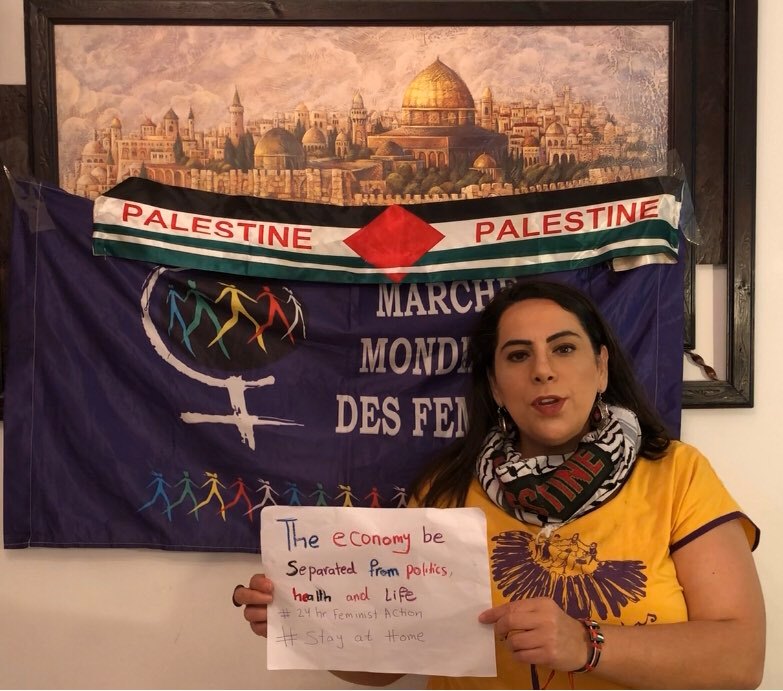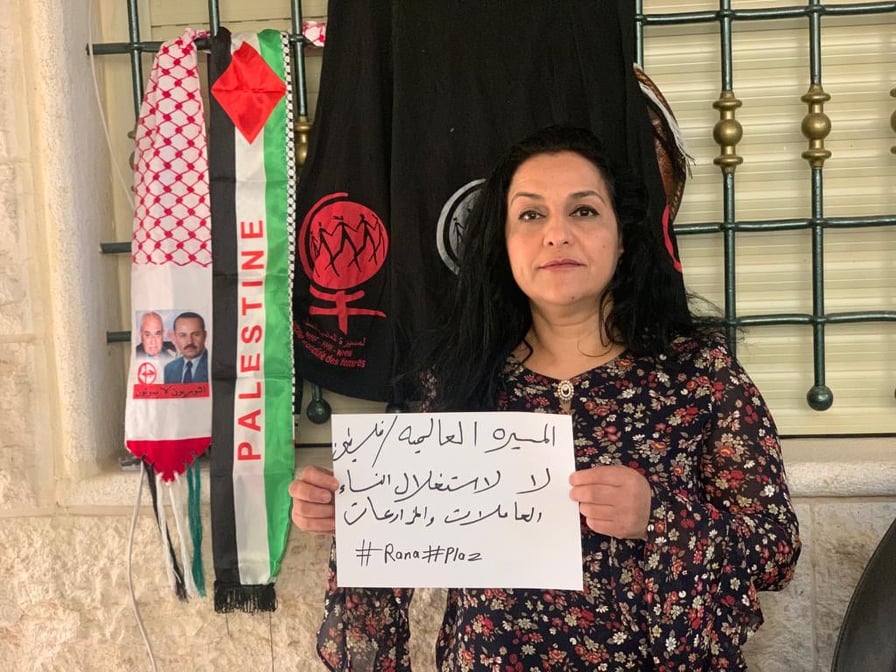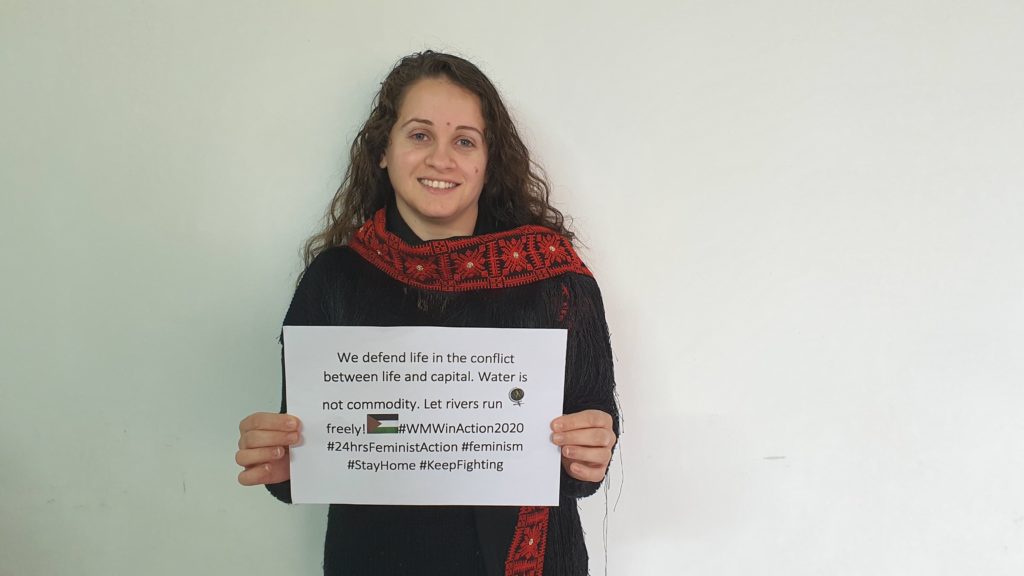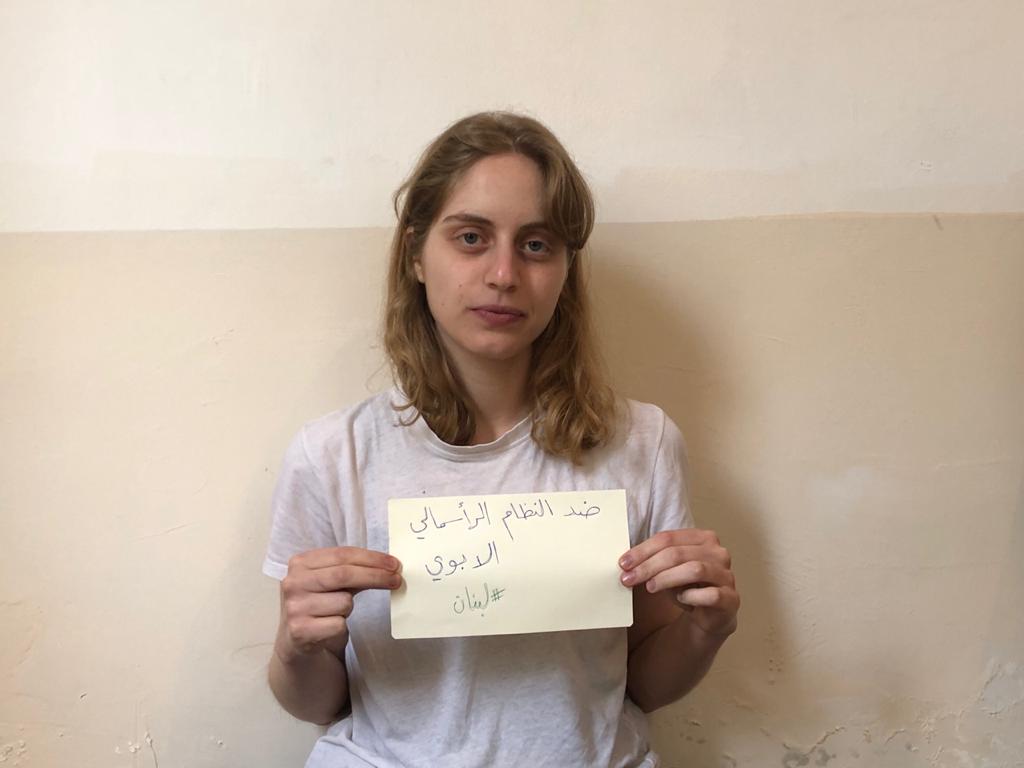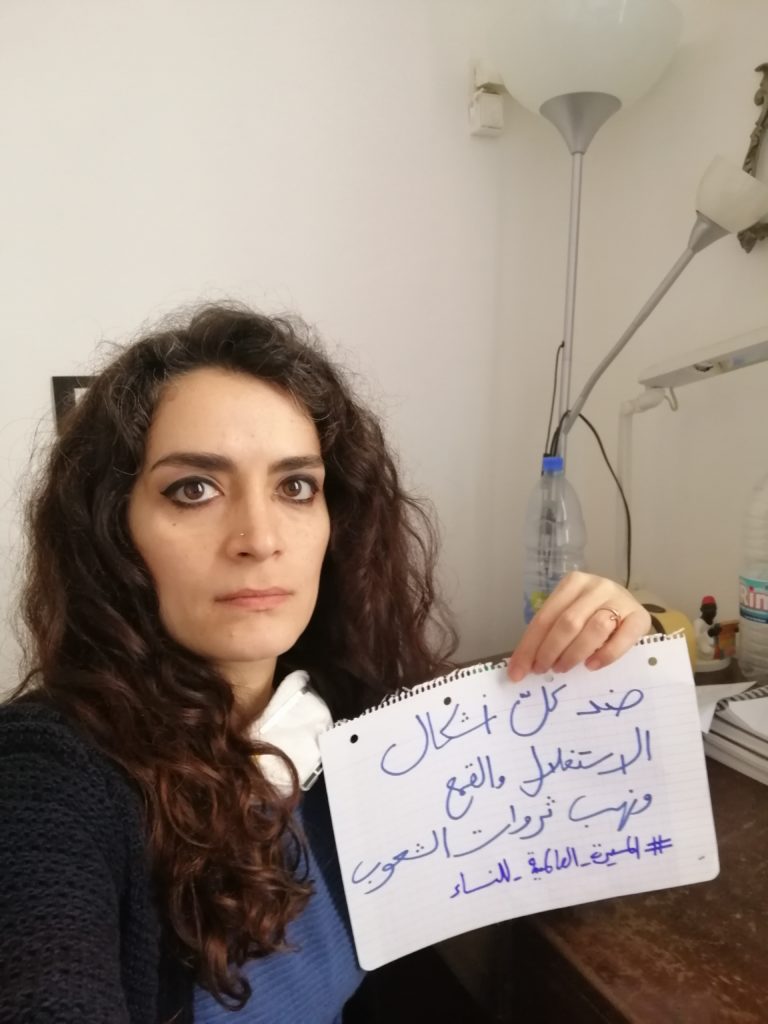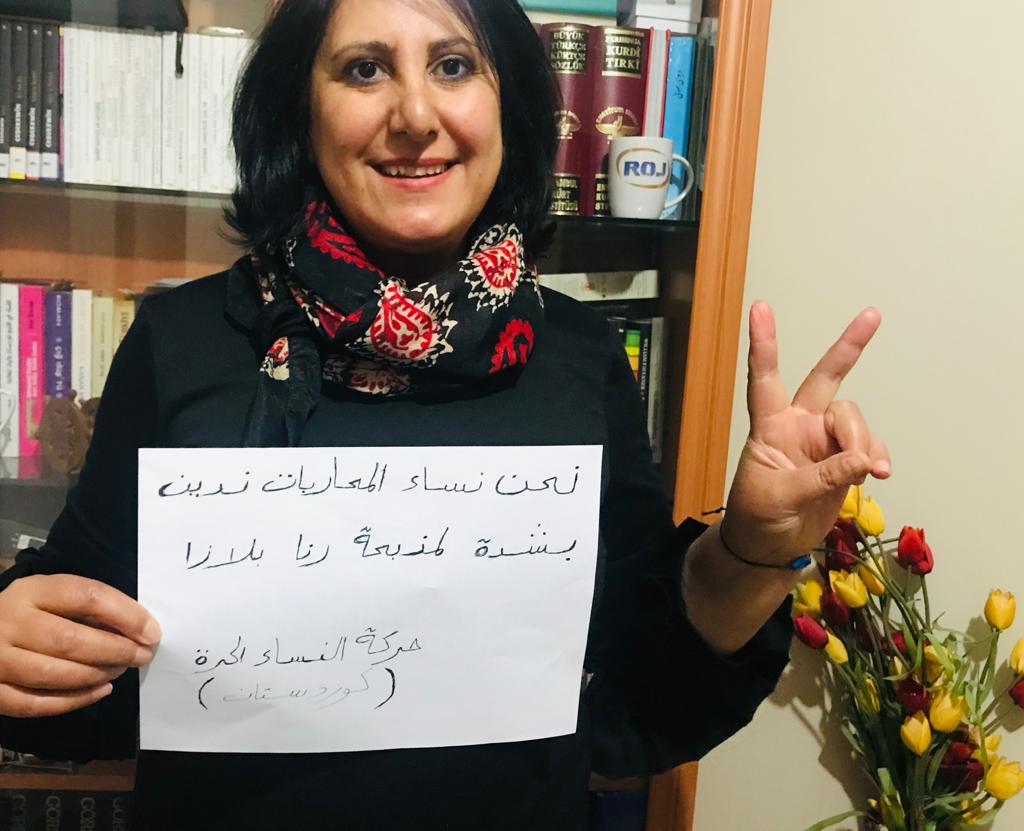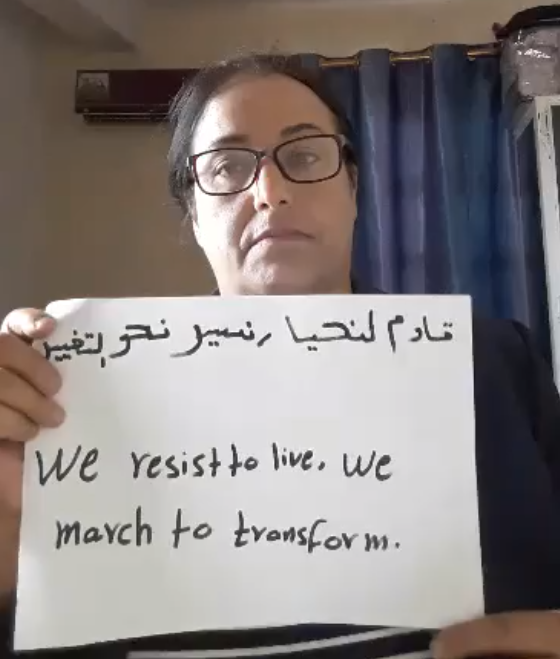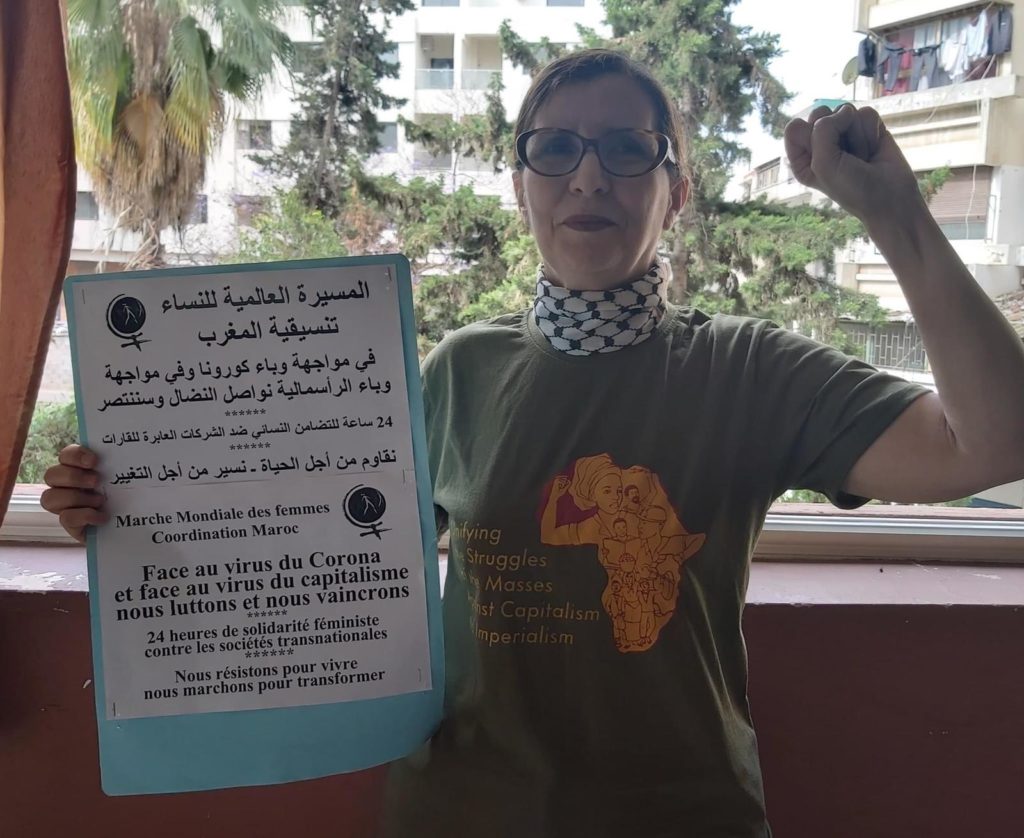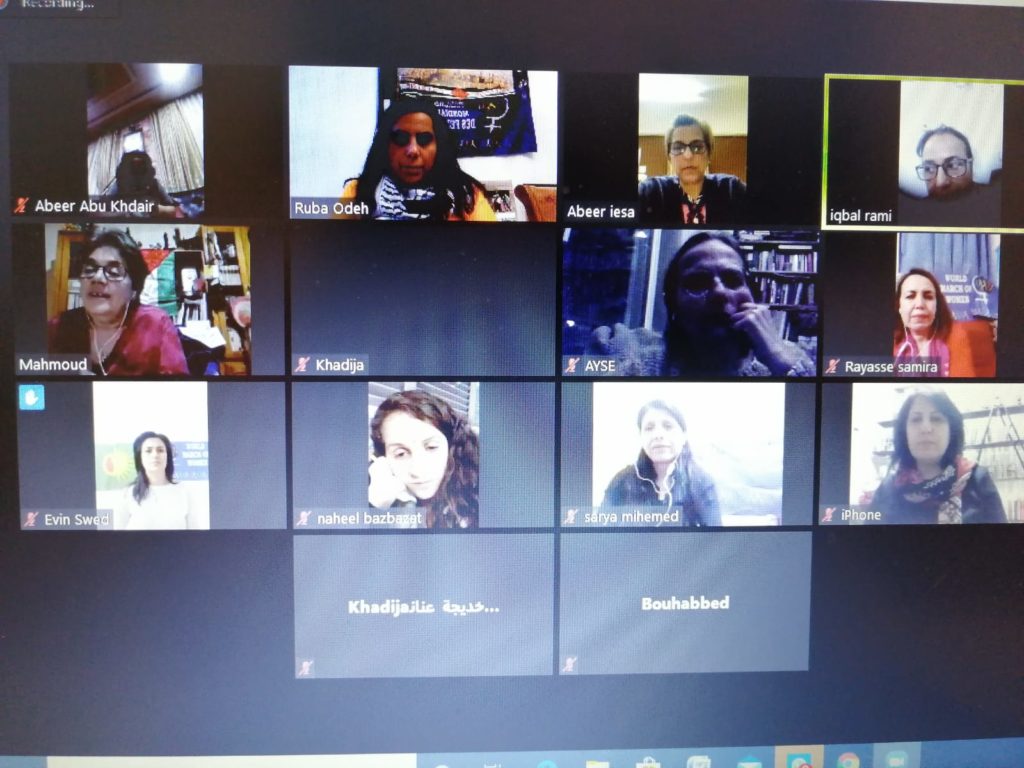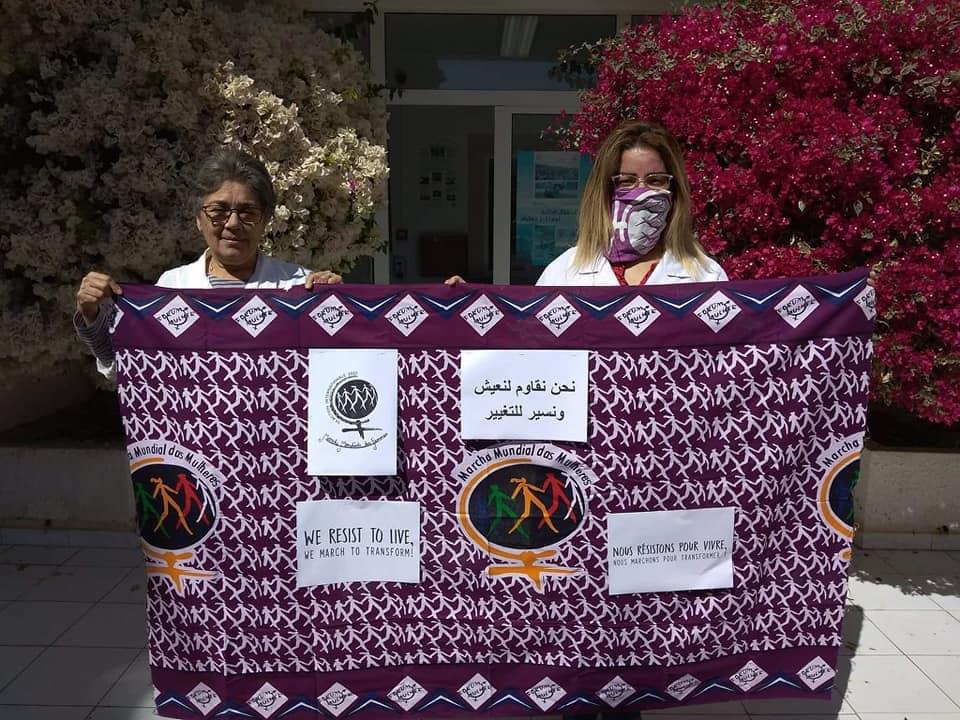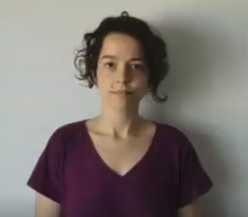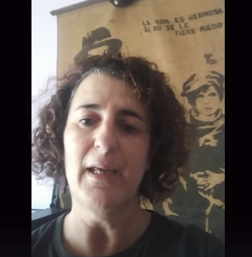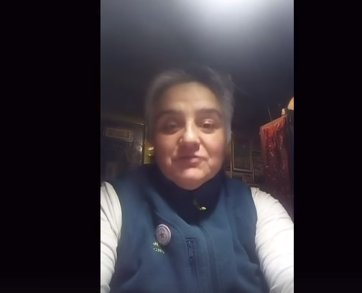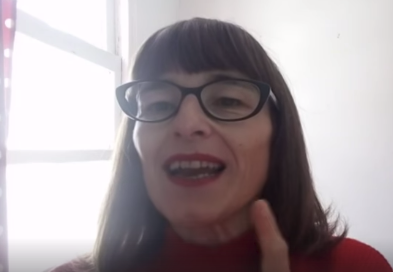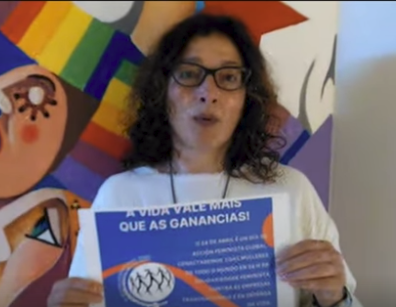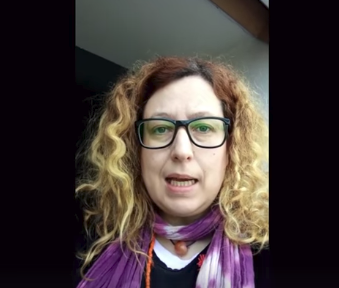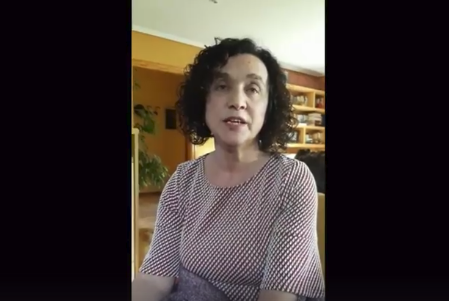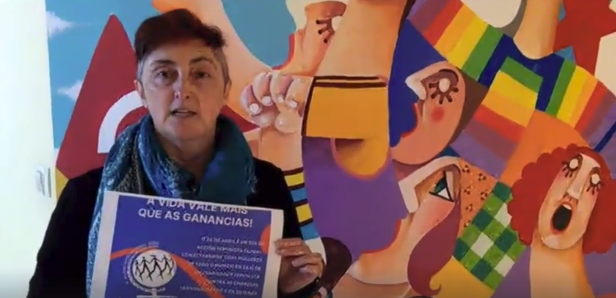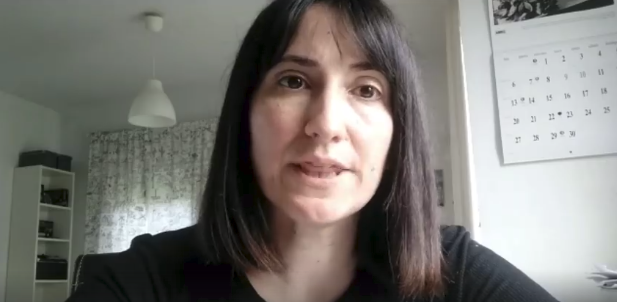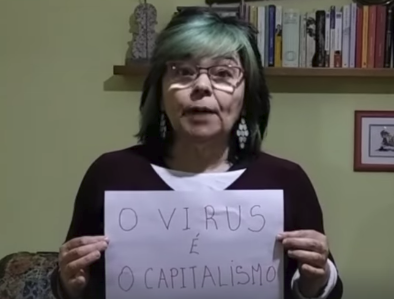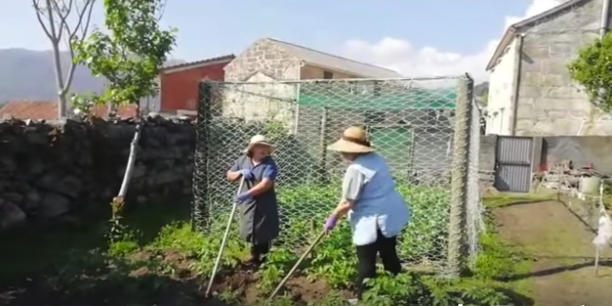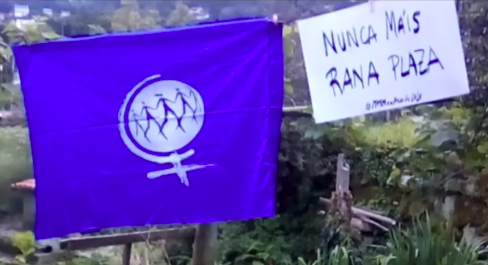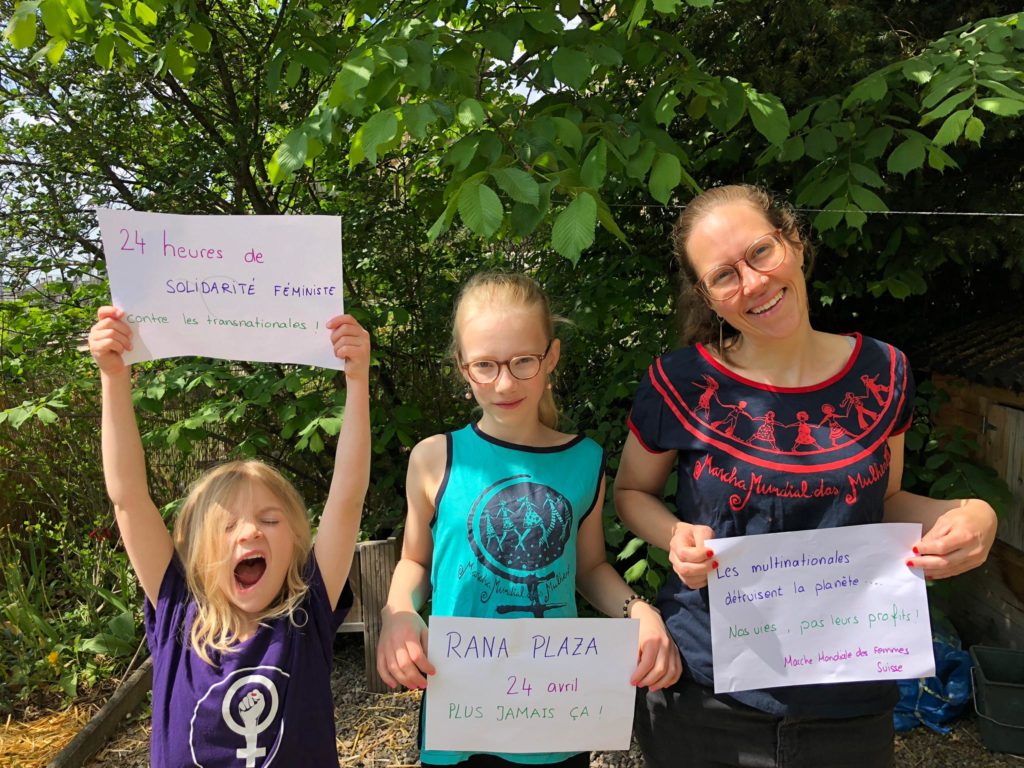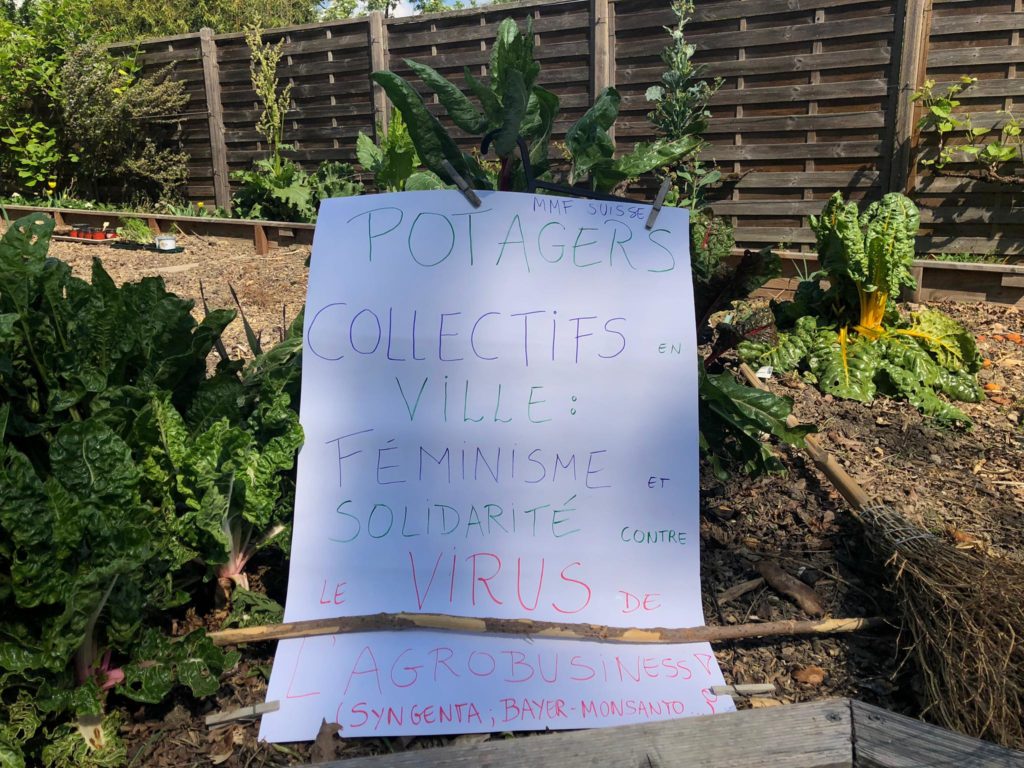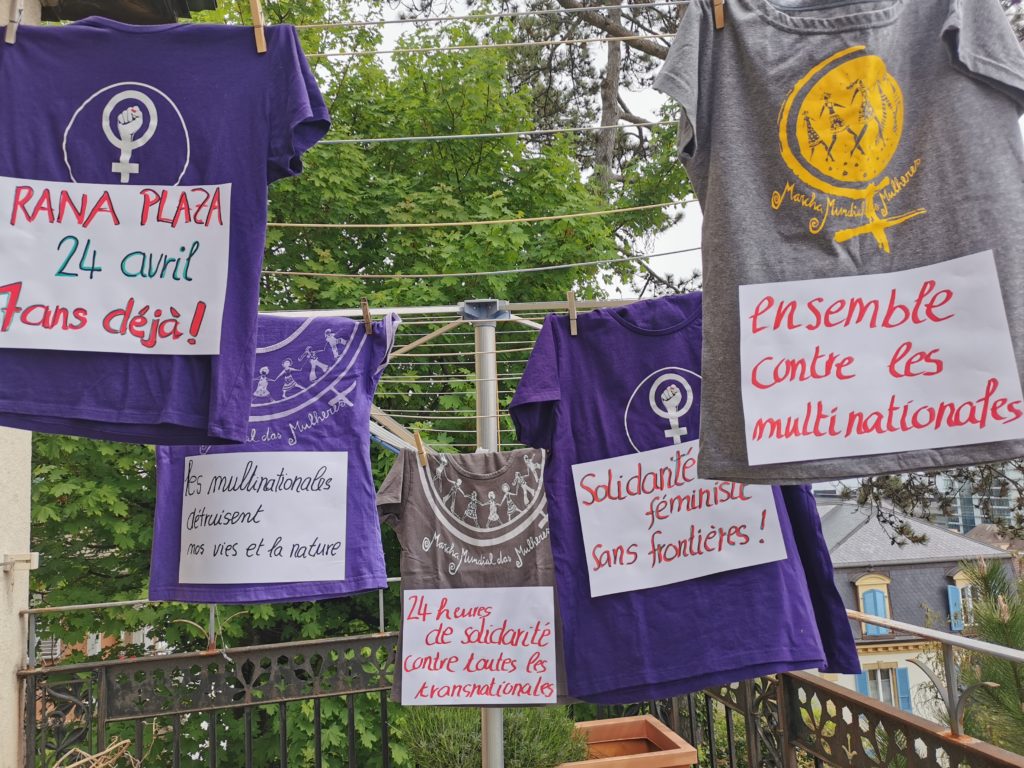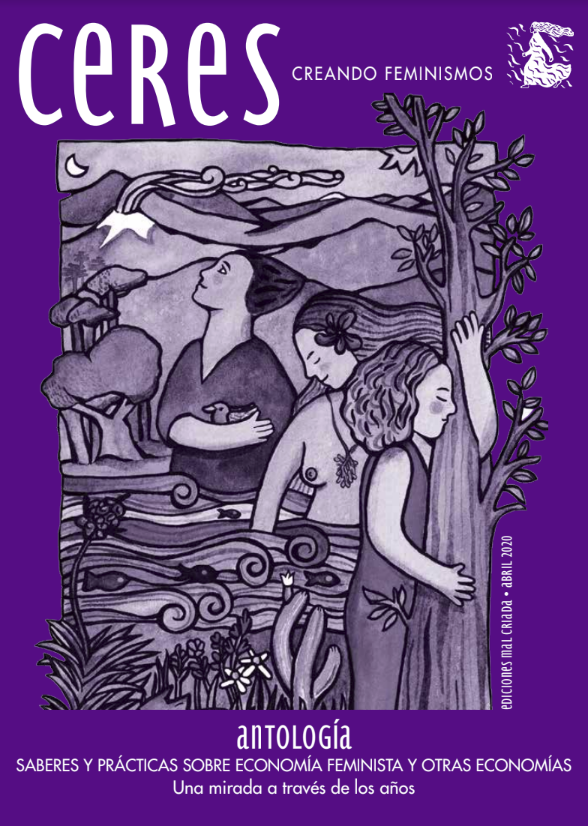The 24 Hours of Feminist Solidarity of the World March of Women Against the Power and Impunity of Transnational Corporations (see more about it here) begun in New Caledonia on April 24th 2020. Every April 24th we are committed to unite around the world to denounce the actions of transnational corporations that exploit and destroy women’s lives.
We are facing the Covid-19 pandemic and the authoritarianism of many governments, and we have set ourselves the challenge of mobilizing while maintaining the necessary social distance for prevention. We do so with our memories of the thousands of women who died and others who were injured in the collapse of the Rana Plaza towers in Bangladesh on 24 April 2013.
Throughout these 24 hours of Feminist Solidarity, this text was updated with the activities carried out by the March around the world. This year, as we celebrate 20 years since the World March of Women first took to the streets in 2000, the activity is part of the 5th International Action 2020.
Today we are going to make visible the alternatives we are building against the capitalist, patriarchal, racist, colonialist power of these corporations, which accumulate more resources than many countries.
The power of transnational corporations is legitimized by the extreme right forces, which reinforce authoritarianism and violence against people in the territories. Our feminist alternatives are a way of resisting and presenting, through concrete practices, the possibilities of changing the world and the lives of women in the same movement.
We resist to live, we march to transform!
New Caledonia
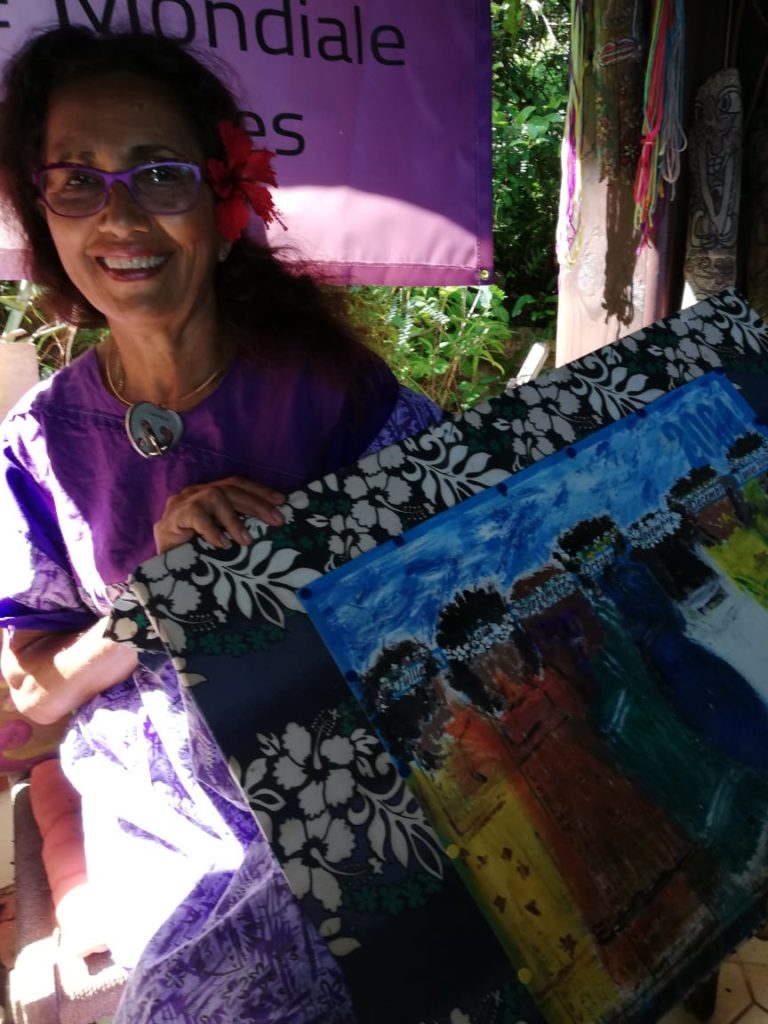
Françoise Caillard, from the World March of Women in New Caledonia, talks about the importance of 24 hours of feminist solidarity for the women of this small country, to connect local struggles with the international movement. “We mobilize in solidarity with working women, only this international solidarity can change the world,” she says.
Philippines

Today, we are not forgetting corporate crimes in Rana Plaza, Bangladesh on April 24, 2013. Remembering this and the continued crimes of transnational corporations that exploit the territories, precarize the work and leave a trail of destruction to ensure their profits, the World March of Women Pilipinas says — Stop mining in Didipio, Homonhon, Brooke’s Pt! Support local food production systems, protect local food producers. End corporate control over public health. People before profit! #StopCorporateCrimes
Pakistan
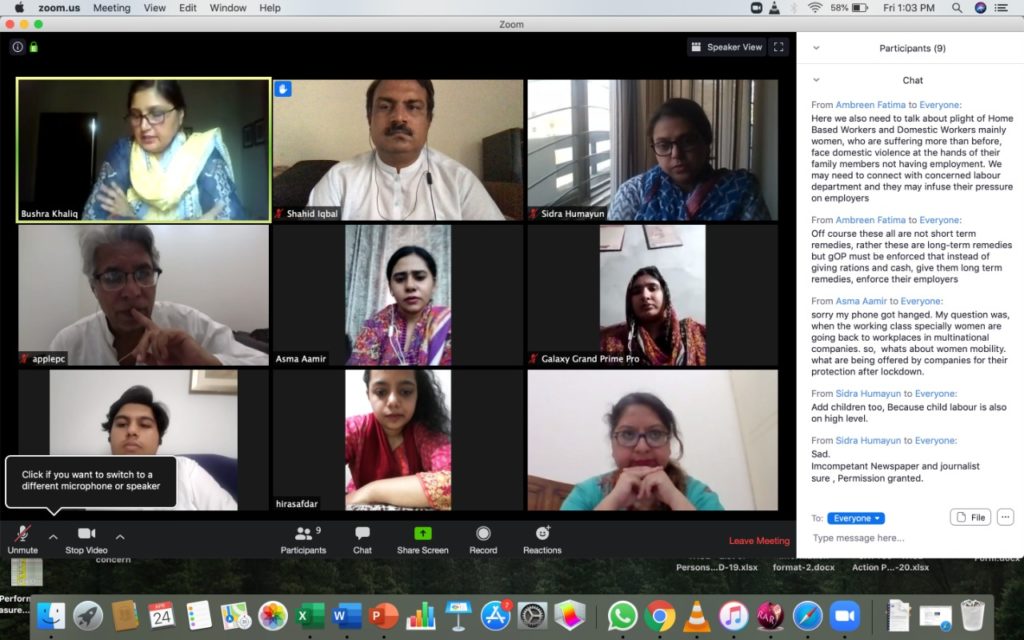
The WMW national coordination body and social activists in Pakistan extended their solidarity with the workers of the world especially the victims of Rana Plaza tragedy in Bangladesh. They held an online meeting organized by Women in Struggle for Empowerment (WISE); the topic was People Before Profit: “Understanding Corporate Power and Impunity”. The for the full report on the meeting, joined by thirteen people from eight districts, among them the country focal person of CADTM-Pakistan, rights activists, peasant’s leadership, journalist, medical officer, is in the end of this abstract. They started by recalling the tragic incident of Rana Plaza. “Expressing solidarity with the victims and their families, on April 24th, once again we are here to raise our voices against the corporate crimes of these transnational powers, their violations against women and peoples around the world”, told Bushra Khaliq, member of the International Committee of WMW and the National Coordinating Body in Pakistan.
Transnational Corporations (TNCs) are among the world’s biggest economic institutions. The TNCs have a predatory business model and connivance with the ruling elite of developing countries. A rough estimate suggests that the 300 largest TNCs own or control at least one-quarter of the entire world’s productive assets, worth about US$ 5 trillion. Plenty of corporations are on par with some of the largest economies in the world: Walmart exceeds Spain and Australia, for example. Of the top 100 revenue generators, 71 are corporations. The cash that Apple has on hand exceeds the GDPs of two-thirds of the world’s countries. Tax evasion, mis invoicing, intra-company trade is common practice of the TNCs. These companies choose locations for personnel, factories, executive suites, or bank accounts based on where regulations are friendly, resources abundant, and connectivity seamless, often having legal domicile in one country, corporate management in another, financial assets in a third, and administrative staff spread over several more.
The division of the society has the worst effects on working women and in this crisis companies increase the burden upon them. Nestle milk factory, in Kabirwala, has been exploiting the natural resources without respecting the labor laws in Pakistan. During the COVID-19, several workers were laid off. They are now blackmailing the peasants by refusing to purchase their milk. The worried farmers have no option but to sell the milk at lowest price, offered by Nestle. Also in Kabirwala women cotton pickers work under harsh weather, against minimal wages, exposing themselves to different pesticides normally sprayed on cotton by the farmers. Several TNCs, including IKEA buy raw cotton material from Pakistan, but they rarely perform their due corporate social responsibility in this regard. There should be accountability of all the exploiters throughout the cotton supply chain, from local contractors to manufacturers of final product.
The majority of poor women in district Rajanpur, South Punjab, work in the tobacco processing sector, for contractors that sell their product to big tobacco companies. The workplaces are dingy, without proper light and ventilation. The women workers are directly exposed to the hazardous tobacco odor. In Pakistan cities, during the pandemia, several big brands, big shopping stores and multi-national companies kept offices open but their employees, especially the working women, have to risk their health in commuting to work and have no support from the companies. Also medical staff in the hospitals are facing the absence of sufficient necessary equipment.
The government should extend all necessary services to the domestic workers, cotton pickers women, home based workers on the priority during the lock down. The social protection, food and protective items to the daily wagers, workers and people living in the slums is urgent. This is a matter of grave concern particularly in a country where 46% population is already living below poverty line. And the media, under the State control, a State that is the biggest protectors of the crony capitalism and TNCs instead of caring and prioritizing the needs of their citizens, doesn’t give space to the opinion of the civil society. Regarding this, women have to rethink the strategy to reclaim their rightfull spaces.
Turkey

On 24 April 2020 at noon for 24 hours solidarity against TNCs the WMW Turkey held a webinar with invited speakers from the frontline of the struggles against TNCs from different regions of the country.
Bellow you can see the report on this webinar, talking about the women’s struggle against transnational mining companies and the need to converge struggles that are taking places in many countries, because the transnational corporations activities are decided in their countries of origin but impact other places as well as governments decisions — in their favour.
#StayHomeButNotSilent #KeepFighting #WMWinAction2020 #24hrsFeministSolidarity #feminism #StopCorporateImpunity #DismantleCorporatePower
Ivory Coast
Women of the World March in Ivory Coast discuss the land dispute between transnational corporations — which carry out perennial agriculture (cocoa, coffee, rubber, palm oil, cotton) controlled by transnational companies — and farmers, who plant food for the population and their families. WMW’s struggle in Côte d’Ivoire is to promote women’s right to use the land.
Zimbabwe
Rita Nyampinga – “In this experience of covid-19, they are telling us that capital is superseding life. And we say no to that. Our lives, those of our children, those of our elderly are important. We say no. We say no to capital, to capitalism, to transnational corporations getting rich at our expense. Enriching with covid-19. No! We need lasting solutions!”
South Africa
Wilhelmina Trout, from World March of Women in South Africa, talks to Alessandra Ceregatti, from the WMW Brasil, highlighting the importance of the 24 hours of feminist solidarity and recalls how women’s work is exploited by transnational corporations. The action of transnational corporations is a way of colonizing Africa and exploit its natural resources. The corporations control the entire process from raw materials to the distribution of goods, which return to the country in the form of manufactured products.
Mozambique
The World March of Women of Mozambique sent this video to join the chain of solidarity to Rana Plaza and denounce the negative impact of transnational companies on the lives of women and communities. Domestic workers, women living with HIV, women working in cross-border informal trade (the muqueristas), women from the National Farmers Union, the Alliance of Women Workers demand respect and an end to violence and exploitation.
The Women’s Forum also held an online meeting in which all these women participated, around the solidarity and issues faced by women workers at this time of pandemic. There was much criticism of the private sector, which is making massive layoffs that they say are the effect of the pandemic but which already had problems managing their businesses. While these businesses remain this way, women working informally are prevented from crossing borders to buy the goods they sell. This work supports families and also moves the local economy.
Now the women are prevented from doing this with their carts and forced to rent together large trucks, the only vehicles that can cross the borders. Customs officers, however, retain the goods, including perishables. And there are women who take out bank loans to rent the trucks. In addition, they are now prevented from taking to the streets and, at the risk of great police repression, occupying public space to make their sales. Confined to their homes, women have problems feeding their families and also face the increase in domestic violence. But they do not stop fighting. “The alternatives that women create are alternatives that serve to improve lives, be it their and their lives or the lives of us all,” they say. And they reaffirm: we resist to live, we march to transform!
Kenya
Comrades from the World March of Women Kenya greet us. They remember Rana Plaza, they march in solidarity with the women of the world and they are ready to face the power of transnational corporations!
Morocco, Tunisia, Palestine, Iraq, Lebanon and Kurdistan
The coordinators of the World March of Women in North Africa and the Middle East published today the statement “Against the coronavirus epidemic and against the capitalist epidemic, we will continue to fight and win.” They remember Rana Plaza, speak of the precariousness of work, the exposure of women workers to the coronavirus pandemic, violence against women and the spread of coronavirus among the political prisoners in the region’s jails.
The women of the WMW in Morocco, Tunisia, Palestine, Iraq, Lebanon and Kurdistan tell us that they are mobilising for the 5th International Action and salute the women of the world, including women workers in their continuous struggle against capitalism, imperialism, occupation, violence, discrimination and political persecution. They confirm their struggle for the goals set by the World March of Women at its last international meeting in October 2018, based on the principles and values of the Women’s Charter for Humanity. They note that the economic and social policies of their countries are a source of poverty, hunger, unemployment, illiteracy and violence against women. “Women fight on the margins of cities and towns for the right to land and water, for access to the right to education, health and work in order to live with dignity, women workers fight against exploitation, conservatism and patriarchal domination.”
They salute the political prisoners of the region’s authoritarian regimes, Palestinians, Kurds and Moroccans, and demand their release. Finally, they salute all the oppressed women of the world and the peoples who are eager to be free, in their struggle against globalisation, Zionism and US imperialism, which is destructive of human rights. And they repudiate the imperial wars, especially the French ones, to plunder the wealth of Africa and to violate the right of the peoples to decide their destiny.
Besides making the the statement, they published messages from sisters from the MENA region and held an online meeting with the countries that are part of it.
Macedonia

Online action of the Macedonian comrades. “Women in textile industry work for 150 euros monthly salary, sewing shirts for well-known transnational companies, that cost several hundred euros each. In a month, every woman sews 60 shirts or brings 9000 euros to the company, and for that she receives only 150 euros.”
#RanaPlazaiseverywhere
Euskal Herria
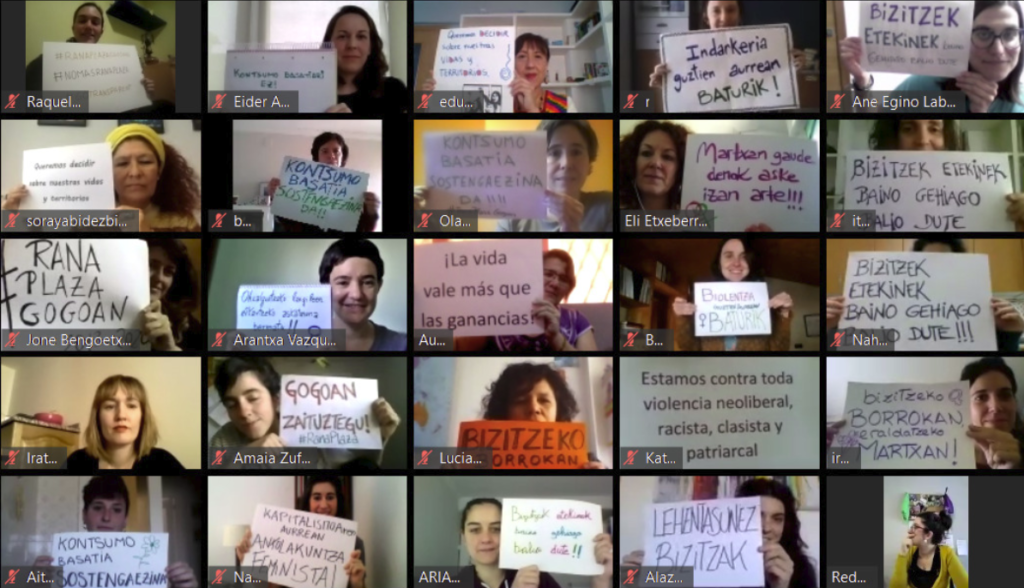
The women of the WMW in the Basque Country are mobilising online to collectively denounce the precariousness of the work of transnational garment companies and the neo-liberal, racist and patriarchal violence. #RanaPlazaGogoan — No mas Rana Plaza is one of the shared hashtags. The March is part of the Ropa Limpia platform, in defense of women garment workers in the global supply chain.
From the World March of Women of the Basque Country they speak:
Idoia Altuna, trade union delegate: “We denounce the feminization of precariousness in department stores and in the textile industry in general, which condemn women to work in terrible working conditions. We also call for awareness of the production model of the big clothing brands, which lower their prices at the expense of the quality of life of millions of women”.
Cony Carranza Castro, Salvadoran, popular feminist educator, is part of the collective Women of the World Babel, Garaipen and the WMW in the Basque Country. She carries out part of her activism with other migrant women, mainly from Central America. She denounces the exploitation by transnational companies in the territories of Abya Yala which forces women to leave their places of living; and, also, the conditions of precariousness and exploitation experienced by women who carry out domestic and care work when they migrate. “To resist is to generate spaces of care and attention among us, and that is what many migrant women are doing.
Julia Marti, feminist activist and researcher at the Observatory of Multinationals in Latin America, denounces the power of transnationals and their influence around the world. Specifically, she talks about two Basque companies, BBVA and IBERDROLA, which exercise their economic, social, political and legal power and evade taxes, dispossess territories, make people’s lives more precarious, finance arms companies, and are also involved in corruption cases. These forms of action are supported by a legal architecture that allows them to act with total impunity.
RanaPlazaGogoan #NoMasRanaPlaza #GoTransparent
Galiza
In Galicia, the comrades published videos in feminist solidarity against the actions of transnational companies and about the struggle to put life at the center of politics and the economy. “For capital the essential thing is profit, for us the essential thing is life. We resist the commodification of health and march to put life at the center! “We resist free trade, we march for peoples’ integration!” “Life is worth more than profits!” “The purple makeup of the transnational corporations hides the violence and exploitation of capitalist accumulation.” “Who makes your clothes? Transnational companies destroy our resources, steal our labor and exploit thousands of human beings in the world, most of them women.” “”80% of the data collected in the world is owned by five companies. Our lives converted into goods and capital. We resist surveillance, we march for free and secure technologies”. “We resist agribusiness and march for food sovereignty.” “The way out of the economic crisis cannot be more power for the transnational corporations. More power for the people!””We resist to live. We march to overthrow capitalism and patriarchy.”
feminismo #feminism #StopCorporateImpunity #DismantleCorporatePower #Mujeresenccion2020
France
This video was made by the World March of Women Occitania in order not to forget the collapse of the Rana Plaza. Multinationals are fattening at the expense of working conditions and the health of workers. STOP the impunity of the multinationals. Rana Plaza never again!
Catalunya

In Catalonia, Marxa Mundial de Les Dones-Catalunya articulated three themes in its online mobilization: the denunciation of environmental and human rights damages caused by transnational corporations, the denunciation of the business of caring for the elderly and the defense of climate justice.
Big companies like Endesa, Naturgy, Iberdrola, Agbar are trying to sell their “green capitalism” and their concern with climate change. With this, they try to hide human rights violations and environmental damage caused by their activities in the Global South region and ensure the maintenance of their business in the management of essential goods. “Water and energy are essential goods for life and their management cannot be a business”, publishes MMM-Catalonia.
One of the serious aspects of Covid-19 in the Spanish state was the death of elderly people in retirement homes. “This tragedy, however, has been going on for years,” says MMM Catalunya. “Multinationals and funds of vultures like DomusVi, Amavir, Orpea, ACS, Sacyr, Eulen, among others, run a 2.5 billion euro business,” the nursing home business. “Privatization and the mercantilization of health and care make us more vulnerable and place on women the burden of sustaining lives.” Neither health nor education can be business! We advocate a public, universal, quality and democratic health system.
The Marxa is participating tonight in the 2020 Rebelión por el clima, a movement for climate and social justice that is going to manifest from windows and balconies.
MarxaEnAccio2020 #SanitatPublica #AiguaVsNegoci #EnergiaVsNegoci #JustíciaClimàtica
Switzerland
In Switzerland, the WMW invited all women and men in solidarity to write a slogan on a T-shirt or fabric, to hang in the windows or on balconies: “Multinationals are destroying our lives and nature; feminist solidarity against borders; Rana Plaza, already seven years, we don’t forget! “Understanding, explaining and denouncing how transnational corporations operate and how they increase, in this time of pandemic, the inequalities and precariousness of women workers is one of the goals of this 24 Hours of feminist solidarity against the power of transnational corporations.” They also announced women’s proposals for an economy and society organized by values other than profit! Collective vegetable gardens in the city: feminism and solidarity against the agribusiness virus!
Portugal
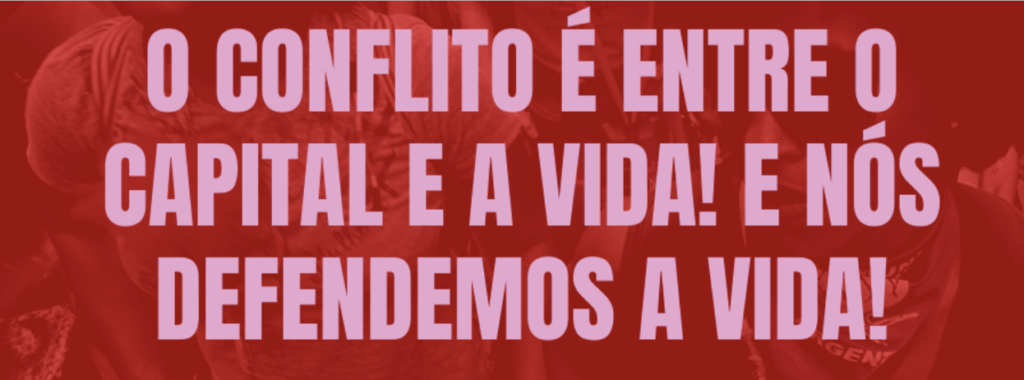
In Portugal, the march promoted actions on social networks and issued a statement on the 24 hours of Feminist Solidarity. “In times of COVID-19, we know well that the ‘essential’ thing is to clean, nourish, care for, treat, educate. Produce food, bring and take essential goods, inform, organize wills, diagnose, seek solutions and treatments. It has become clearer what are the essential jobs for life: care (paid or unpaid), food production and all the daily jobs, often invisible, that ensure that life goes on. And, as feminist critics have reminded us, this is work done mainly by women: some of it, unpaid, is done in families and in the communities closest to them; some of it, often poorly paid, in precarious conditions, without rights. In other words, work essential to life is what has allowed our existence but has been made invisible, devalued and carried out at the expense of the oppression of women and other carers.
But we also learn that (our) work may even be essential to the economy, but we cannot stop, even at the risk of our health and our lives. Therein lies a strange choice of priorities: while it is our work that sustains the economy, it is not our health, our lives, the common good that matters. Many companies have not stopped, not guaranteeing minimum safety conditions or, even more cruelly, paid leave for sick workers. Many companies make the same demands of people who work remotely, regardless of the concrete changes in everyday life, homes that are schools and workplaces, compressing time and space and increasing the need for domestic and care work, especially for women. Against the dictatorship of profit, we resist for a dignified life”.
United Kingdom
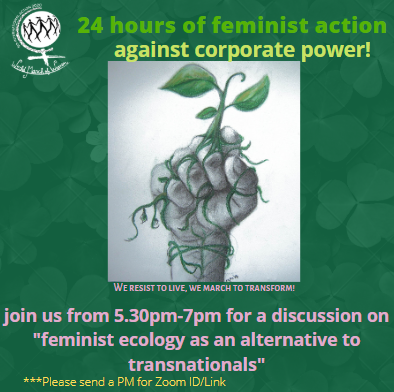
Companions from United Kingdom organized an online discussion about “feminist ecology as an alternative for transnationals” with companions from Rojava.
Azores

Every day can be a new shortcut
In building another world
We’re together!
Against the virus of capitalism
And oppression
For the dignity of the woman, of her life and work.
We resist to live!
Against the machismo virus
Gender and domestic violence
No more wives murdered by husbands, boyfriends or ex-partners.
We march to transform!
Because another world is possible and necessary.
Feminist Solidarity Always!
Azores, in the 24 hours of feminist solidarity
Clarisse Canha
Brasil
In Brazil, the March made a live broadcast between 12 noon and 1 p.m., with the participation of activists from several states in the country. It was a space to expose the resistances, as well as the alternatives of women in movement. They denounced the way in which companies expel women from the territories (wind turbines, mining companies) and also the hypocrisy promoted by them, who have been doing marketing campaigns during the pandemic (with online shows and collection campaigns) while cutting rights, firing workers or pressuring them to come out of isolation.
A video was shown of women from the Landless Workers’ Movement (MST) denouncing Bayer, a company bought by Monsanto, which promotes the destruction of nature and the release of more pesticides. The defense of environmental justice and the denouncement of the so-called “green economy” was one of the central themes of the debate, due to the numerous attacks by large corporations and, in response, to the intense resistance of the peoples in their territories – as is the case today with the resistance to Vale, a mining company that accumulates criminal episodes of expulsion of communities, criminalization of leaders, in addition to the brutal tragedies of Mariana and Brumadinho. The transnationals that want to privatize common goods such as water were also denounced.
Feminist criticism was made of labor exploitation, especially under the neoliberal government of Bolsonaro, which withdraws labor rights, approves the Pension Reform and encourages the exploitation of workers in call center and e-commerce companies, especially in times of pandemic.
WMW activists have made presentations on our feminist and anti-systemic paths and alternatives, such as the resistance of the women of Chapada de Apodi, in their struggle for land and its cultivation without pesticides; the construction of popular feminist communication, using free and safe alternatives instead of services from big transnationals that steal and sell our data; and the construction of the movement itself.
Cuba
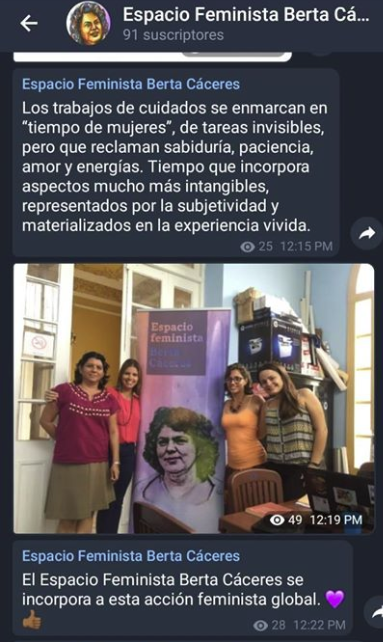
Cuba has joined the 24 hours of feminist solidarity, quoted our 24-hour call for feminist solidarity and started a cycle of talks on the economic situation in times of pandemic. “The appeal has called for the answers to various questions to be unveiled from the networks: how women, their families and their Communities are surviving this coronavirus pandemic that is characterized as patriarchal, capitalist and racist? How long will we continue to be conditioned to this reality? And what are the changes that need to be promoted to transform our societies and overcome this system that causes deaths, diseases and wars?”
The women carried on the series of talks “Women Speak: Economic Situation in Covid-19 Times”, with the Cuban Women Federation. Using the keywords #SolidaridadFeminista, #MujerCubana and #CubaSalvaVidas and #QuedateEnCasa, they denounced the criminal and unjust blockade that is intensifying in these times despite the harsh situation imposed by the pandemic that is hitting practically all countries of the world.
Argentina

CTA-Autonoma, central workers union, joined the call of the World March of Women and called for an online talk and a network mobilization in Argentina on the theme “Life is worth more than profit”. In addition to demonstrating against the power and impunity of transnational corporations, the broadcast discussed about the context of the pandemic from a working class and feminist perspective — among other issues, how the transnationals of the pharmaceutical industry intervene in our bodies.
They observed that we should take up the debate that we held some years ago on the medicalization of life and especially the intervention of the medical-pharmaceutical complex in the body and health of women. It is a medical-pharmacological complex because many health professionals receive significant profits from the drugs they prescribe to their patients. Excessive pharmacological and surgical intervention is an extraordinary business for pharmaceutical companies. It is sustained when they try to tell us that natural stages in our life such as menopause, menstruation, pregnancy and childbirth become medical problems that require intervention. One example is hormone replacement therapies which, despite the fact that the enormous harmful effects on our bodies have been proven for a long time, are still used because they generate enormous profits.
Furthermore, through enormous advertising expenditure, we are told that we are defective and offered enormous amounts of drugs to make us more fit, less ill. The sisters point out the use of contraceptive drugs in our girls who begin to use them around the age of 11 when, in addition, capitalist society hypersexualizes them and conceives them as objects of consumption. And the use of tranquilizing drugs to try to make us endure strenuous days and surgical interventions so that we continue being beautiful and always young. Health research is exclusively pharmacological, it is financed by the transnationals who are clearly not interested in our health but in selling their products.
Chile
The activists of the World March of Women in Chile launched at midday an anthology of texts on the feminist economy, present in the 15 editions of the magazine Ceres, Creando Feminismos.
The activity, which is part of the 24 Hours of Feminist Solidarity, places us before the contributions of feminist economics to reflect on the difficult moment we are living in all over the world. Putting life in the center is part of the feminist project for the economy and for another world that is possible!
Macro Norte Peru

The World March of Women of the Macro North Peru denounced the transnationals and neoliberal companies that enslave and impoverish our bodies, lives, lands and territories. “Poverty in our country has a face and is a woman’s face: urban, indigenous, rural, afro-descendent, lesbian, young, single mothers who are now the ones who are caring and worrying about the sick and the daily bread of their family and community.
The WMW denounced the agro-exploitation, mining and oil companies that, despite the COVID 19, have continued to produce and exploit, harming the health and life of the people. The WMW also denounced the governments that have put capital at the center of the economy and that have made laws more flexible for the entry of transnational corporations into the country, having ensured cheap slave labor with laws such as Climper and the possibility of suspension of work without pay.
“In our country and regions, the same neoliberal governments have been reducing budgets, weakening hospitalization systems, and now we see the consequences. Health is not a business, it is a right”, says the declaration, which emphasizes that it is women who generate community solidarity strategies, from the neighborhoods to confront Covid-19. “This disaster cannot go unpunished, it is the result of the historical violation of our lives, commodifying and privatizing our health and access to basic services”.
Venezuela

In Venezuela the action started at 12h in Caracas in social media and continued at 16h with the video forum “What does it mean to put life in the center of politics?”.
Mexico
The World March of Women in Mexico called for a virtual meeting at 12 noon to join the 24 hours of Feminist Solidarity, in a context of contingency due to the pandemic. Comrades from different cities in Mexico and diverse organizations participated. They stated that the current pandemic is not about “nature” defending itself. The capitalist, colonialist and patriarchal system is at the root of the inequalities that are becoming more evident at this time. Extractivism has not stopped, femicide has not stopped. Women are not safe in our homes.
The pandemic is not affecting us in the same way, and that although many people would like to “stay at home”, in many cases daily sustenance depends on the possibility of going out. Women still have informal and precarious jobs. We sustain the economy with our work, often unrecognized. The big transnationals put profits above life. We, on the other hand, put life in the center. In the face of authoritarianism, militarization, repression and every man for himself, we affirm that the way out of the crisis must be collective and inclusive.
They also spoke of feminist economics as a response to the crisis, because it gives priority to the sustainability of life and considers that we are interdependent among ourselves and with nature. These are alternatives that already exist, that are underway, and that we have to multiply and connect at this time. For example, the peasant women organized in the Flor de Luna market, who defend food sovereignty and the community fabric. Or the campaign “Together we achieve more”, created at the meeting of women defenders: weaving stories and territories. From there, communication processes are promoted that strengthen political subjects, making stories visible from diverse voices that the system wants to make invisible. They also recalled the importance of having allies who amplify our messages, such as feminist, autonomous, and social movement press spaces.
United States

“We hold close to our hearts the memories and the lives of over 1,000 garment workers, mostly women, who died in the Rana Plaza building in Bangladesh in 2013. In their honor, we continue to struggle for dignified working and living conditions that only a feminist economy can bring about.”
They shared the Rainbow Collective’s Udita (Arise) documentary, that looks at 5 years of the garment workers rights movement in Bangladesh. https://www.facebook.com/289917617744230/posts/2767350200000947/
RanaPlaza #WeAreAllRanaPlaza #TodxsSomxsRanaPlaza #FeministEconomy #GrassrootsFeminism #RanaPlazaIsEverywhere
Quebec
The World March of Women in Quebec made a video to once again denounce the disaster that occurred at the Rana Plaza in Bangladesh in 2013. The Rana Plaza housed workers in the textile industry, employed by large multinational companies. To remember this tragedy, we have declared April 24 as a day of remembrance that calls for solidarity and global action. The comrades from Québec joined the solidarity chain to denounce the role of transnational companies, especially Canadian mining companies. Three-quarters of the world’s mining companies are based in Canada and operate megaprojects in more than 100 countries, without respecting borders, rights and the environment. The video also talks about the resistance of women and communities to extraction and their fight for environmental and social justice, in defense of life and territories, in internationalist solidarity.
#FeministSolidarity #24hFeministSolidarity #WMWinAction2020
We resist to leave, we march to transform!

